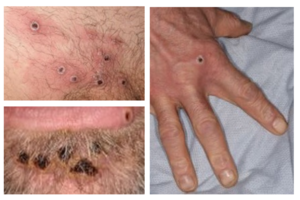
Monkeypox rash lesions (photo credit: UK Health Security Agency)
An Atlanta man has contracted monkeypox, Nancy Nydam, spokesperson for the Georgia Department of Public Health (DPH), confirmed this week. The man has a history of international travel.
DPH first alerted Georgians to the case last week. At that time, the patient was known to have monkeypox-like symptoms but further testing was needed to confirm the disease. The Centers for Disease Control and Prevention (CDC) has now confirmed a monkeypox diagnosis.
“The individual remains in isolation at home, and DPH continues monitoring his symptoms and contact tracing – all of which began last week with the orthopoxvirus diagnosis,” Nydam said on Monday.
Monkeypox is one form of the orthopoxvirus. Others include variola, which causes smallpox.
There were no other suspected cases or orthopoxvirus or monkeypox in Georgia as of Monday, Nydam added. Nydam emphasized that this is the same case announced last week and not a new case.
Monkeypox is a viral disease that causes the skin to break out in pustules. It typically starts with a fever, lymph node swelling, muscle pains, and malaise, then progresses to a skin rash. The pustular rash can last two to four weeks, according to the World Health Organization.
The disease is usually mild but can be life-threatening in some cases.
The current outbreak is unusual because, as of last week, at least 780 confirmed cases have been identified in 27 countries where it is not typically found. The disease is considered endemic in certain central and western African areas.
Twelve American states and Washington D.C. had reported a total of 31 confirmed monkeypox/orthopoxvirus cases as of Monday, according to the CDC. That includes Georgia’s case and four from Florida.
So far, the World Health Organization has reported 207 confirmed cases in the United Kingdom, 156 in Spain, 138 in Portugal, and 58 in Canada.
Monkeypox can be transmitted among people through direct contact with the sores or bodily fluids, intimate contact, and respiratory secretions during “prolonged, face-to-face contact,” according to the CDC.
There are currently no monkeypox-specific treatments but medicines developed to treat smallpox can be helpful. The U.S. Food and Drug Administration has approved two vaccines for monkeypox, according to the CDC.
“Anyone with a rash that looks like monkeypox should talk to their healthcare provider, even if they don’t think they had contact with someone who has monkeypox,” the CDC advises.
This story is available through a news partnership with Capitol Beat News Service, a project of the Georgia Press Educational Foundation.
